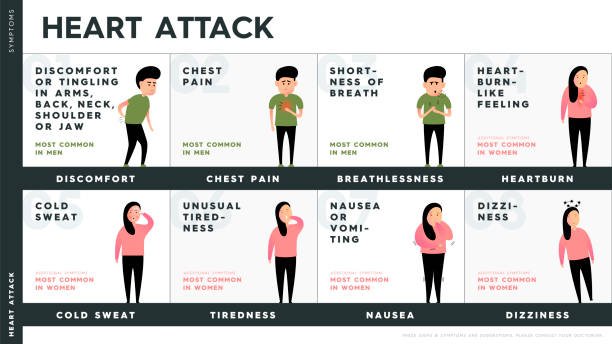
Myocardial Infarction Symptoms Differ Between Men and Women! Women Beware of Stomachache, Cold sweats, and Fatigue
When it comes to heart disease, most people may think of myocardial infarction and obvious chest pain, but you know that there are actually many atypical symptoms of myocardial infarction in women. There are many types of these atypical symptoms, some of which are so mild that they are often ignored as they are not easily associated with heart disease.
This article introduces you to the causes and symptoms of myocardial infarction, as well as ways to prevent cardiovascular disease and heart disease.
Myocardial infarction causes
Myocardial infarction is an acute symptom of coronary heart disease (coronary heart disease), when the patient’s coronary arteries block the blood vessels due to excessive accumulation of fatty plaque or rupture of thrombus. Blood will not flow to the heart, causing myocardial infarction, which is also called ischemic heart disease.
Myocardial infarction symptoms in women
First of all, we must first understand that myocardial infarction is a symptom caused by “complete blockage of blood vessels.” Before complete blockage, patients may have chest tightness or chest pain, which are precursors of myocardial infarction.
In most cases, when patients feel chest tightness, the blood vessels are usually not completely blocked, but if the chest pain is obvious, the situation may be quite serious. However, some patients with myocardial infarction have no symptoms.
In addition, female patients may also feel the following uncomfortable symptoms:

1.Chest tightness and chest pain
This is the most common symptom of a heart attack, but women may experience chest pain or discomfort differently than men.
In women, this symptom may cause a feeling of swelling or pressure, and pain may occur not just on the left side but anywhere on the chest.
2.Shortness of breath and difficulty breathing
If you have trouble breathing without any obvious reason (exercise, labor), this may be a precursor to a myocardial infarction. In addition, patients may have symptoms of shortness of breath and difficulty worsening after activities or when lying down. Sometimes symptoms will ease slightly after the person gets up.
Not only that, patients may also experience other symptoms such as cold sweats and chest pain along with shortness of breath, making them feel like they have just finished a marathon, even if they have done nothing.
3.Abnormal fatigue
Women who have had a heart attack may feel overwhelmed by intense fatigue, even if they are not active. However, this feeling of fatigue is often ignored or regarded as normal while working and doing housework. To avoid this situation, it is recommended to judge in the following ways:
- I feel extremely tired after doing my usual exercise.
- Chest feels unusually heavy.
- Simple activities (going to the bathroom, shopping) can make you feel extremely tired.
- Although I was tired, I couldn’t sleep well.
4.Sweat (cold sweat)
This symptom is different from the sweat we produce when we exercise or are exposed to high temperatures, and is more like the cold sweat that occurs due to stress. People may suddenly break into cold sweats or sweat when they have trouble breathing or shortness of breath.
5.Pain in other parts of the body
Women are less likely to experience chest pain than men. Instead, they may experience pain in the arms, back, neck, jaw, or stomach (this does not mean that men will not have these symptoms). The pain may come gradually or suddenly, and may spread from the chest to other areas. If the person is sleeping during the attack, the pain may wake them up.
Cardiologists recommend that when you experience inexplicable symptoms in any part of your body above the waist, you should immediately inform your doctor or medical professional. For example, stomach pain is often mistaken for a stomach ulcer, heartburn or the flu, rather than a warning sign of a heart attack.
In addition to the symptoms mentioned above, female patients may also experience indigestion, dizziness, headaches and other discomforts.

How can women prevent heart disease?
As women gradually enter menopause, the secretion of estrogen that protects blood vessels will gradually decrease, and the risk of heart disease will also increase. Therefore, menopausal women should pay special attention to their heart health, but where to start?
First of all, regular health check-ups can help you understand the general condition of your body. If you find that your blood lipids are too high, you need to pay attention to whether you have other signs of cardiovascular disease. If family members have heart disease, they should also pay close attention to their heart health, as heart disease may also be passed down through the family. Through these indicators, you can make a simple judgment on your heart health. If you belong to a high-risk group, you should pay special attention to whether you have symptoms suspected of heart disease. Once discovered, please get checked as soon as possible.
Fatty plaques do not form overnight and block your coronary arteries. For your heart health, it is recommended to maintain a lifestyle of quitting smoking, exercising regularly, drinking less alcohol, and eating a low-cholesterol diet to reduce the risk of heart disease.












